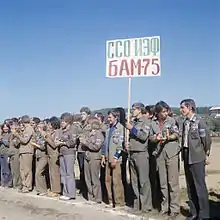
Shock construction projects (Russian: Ударные стройки, romanized: udarnyye stroyki) also Komsomol shock construction projects[1] was a Soviet propaganda term used for certain construction projects by Komsomol shock brigades in the Soviet Union.[2]
Although often associated with Komsomol, shock construction projects in more general term also included the Great Construction Projects of Communism.
The first Komsomol shock construction project was announced for the blast furnace #2 (later became known as "Komsomolskaya") at the Magnitogorsk Iron and Steel Works in 1930–32. The last construction project was an air converting rolling mill for hot rolling at the same Magnitogorsk Iron and Steel Works in 1986–90.
The hire of volunteers for the projects was conducted in a framework of the state system of organizational mobilization, but more often through Komsomol mobilization by Komsomol travel tickets. One of active participants of the 1950s-80s construction projects were student construction brigades under a patronage of Komsomol.[3] In 1980s the status of regional shock construction projects was granted to Youth Residential Complexes (MZhK).
References
- ↑ Komsomol Shock Construction Projects on the Objects of Ministry of Railways of the USSR in the West Siberia (1965-1991). Herald (Altai State University).
- ↑ Schmid, S.D. Producing Power: The Pre-Chernobyl History of the Soviet Nuclear Industry. MIT Press. 2015. ISBN 9780262028271
- ↑ Siegelbaum, L.H., Moch, L.P. Broad Is My Native Land: Repertoires and Regimes of Migration in Russia’s Twentieth Century. Cornell University Press. 2014. ISBN 9780801455131
Further reading
- Kirmse, S.B. Youth in the Former Soviet South: Everyday Lives Between Experimentation and Regulation. Routledge. 2014 ISBN 9781317979258